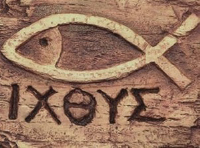 The reality is, you don’t have to be Greek, to be Greek Orthodox, any more than Roman Catholics have to be Roman. Although there are many people of Greek heritage in our parish…there are also many that aren’t. Our parish is a very diverse family, adorned with Greeks, Russians, Ukrainians, Romanians, former Protestants of various types, former Roman Catholics, former agnostics, and former atheists.
The reality is, you don’t have to be Greek, to be Greek Orthodox, any more than Roman Catholics have to be Roman. Although there are many people of Greek heritage in our parish…there are also many that aren’t. Our parish is a very diverse family, adorned with Greeks, Russians, Ukrainians, Romanians, former Protestants of various types, former Roman Catholics, former agnostics, and former atheists.
The worship services at Saint John Church are done mostly in English with some Greek, allowing you to hear a bit of what the liturgy would have sounded like in the ancient Church. In the liturgy book and in the digital version that you can scan into your phone when you enter the church, the Greek and English texts are set side by side, so when something is done in Greek, you can still follow along in English. On Sundays we do the “Lord’s Prayer” in both English and Ancient Greek, and when various people are present, you’ll also hear people do the Lord’s Prayer in their own native languages of Russian, Ukrainian, Romanian, and Spanish, etc.
 So, you may be wondering, if it’s not just for Greeks and it’s not all in in Greek, then why is it called “Greek Orthodox”? Our Church is referred to as, “Greek,” because Greek was the first language of the ancient Christian Church through which faith in Christ was first transmitted. The early Church’s authors of the New Testament wrote it in Greek, and most of the early writings of Christ’s followers also wrote in the Greek language. The Apostles and the early Church were even using the Greek translation of the Old Testament called the Septuagint…because that was the common language throughout the Roman Empire. The word “Greek” is used to describe the Christians who originated from the Greek speaking early Christian Church, who also used classical Greek thinking to find appropriate expressions of the Orthodox Christian Faith. For instance, when the Gospel writer, John, used the word, “Logos,” to describe the Son of God who had taken on human flesh, he took that word, “Logos,” from classical, pagan, Greek thought and Christianized it, offering his readers its fuller meaning as fulfilled in our Lord, Jesus Christ.
So, you may be wondering, if it’s not just for Greeks and it’s not all in in Greek, then why is it called “Greek Orthodox”? Our Church is referred to as, “Greek,” because Greek was the first language of the ancient Christian Church through which faith in Christ was first transmitted. The early Church’s authors of the New Testament wrote it in Greek, and most of the early writings of Christ’s followers also wrote in the Greek language. The Apostles and the early Church were even using the Greek translation of the Old Testament called the Septuagint…because that was the common language throughout the Roman Empire. The word “Greek” is used to describe the Christians who originated from the Greek speaking early Christian Church, who also used classical Greek thinking to find appropriate expressions of the Orthodox Christian Faith. For instance, when the Gospel writer, John, used the word, “Logos,” to describe the Son of God who had taken on human flesh, he took that word, “Logos,” from classical, pagan, Greek thought and Christianized it, offering his readers its fuller meaning as fulfilled in our Lord, Jesus Christ.
 The Greek Orthodox Church is governed through a conciliar hierarchy. On a regional level, our Church is under the leadership of His Eminence, Metropolitan Alexios. He’s the bishop of the Greek Metropolis of Atlanta, who oversees Greek Orthodox parishes throughout eight states in the southeast (including, Alabama, Florida, Georgia, Louisiana, Mississippi, North Carolina, South Carolina, and Tennessee).
The Greek Orthodox Church is governed through a conciliar hierarchy. On a regional level, our Church is under the leadership of His Eminence, Metropolitan Alexios. He’s the bishop of the Greek Metropolis of Atlanta, who oversees Greek Orthodox parishes throughout eight states in the southeast (including, Alabama, Florida, Georgia, Louisiana, Mississippi, North Carolina, South Carolina, and Tennessee).
 Within the United States’ Greek Archdiocese of America, there are 9 such metropolises, who are each under the leadership of their own metropolitans (bishops), who together, are referred to as the Holy Synod of Bishops. Offering spiritual leadership to this Holy Synod of all 9 of those metropolises is His Eminence Archbishop Elpidophoros of the Greek Archdiocese of North America.
Within the United States’ Greek Archdiocese of America, there are 9 such metropolises, who are each under the leadership of their own metropolitans (bishops), who together, are referred to as the Holy Synod of Bishops. Offering spiritual leadership to this Holy Synod of all 9 of those metropolises is His Eminence Archbishop Elpidophoros of the Greek Archdiocese of North America.

